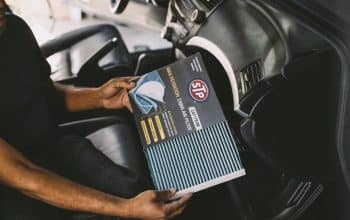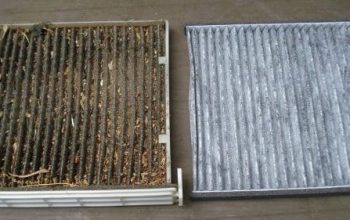Because tire noise is readily misinterpreted, wheel bearing noise is difficult to identify. Even if you are the true noise source, it is difficult to determine which wheel is impacted.
The primary function of wheel bearings is to guarantee that the wheels spin with as little friction as possible. When the automobile comes to a complete stop, the bearings begin to cool, and a vacuum is formed by the lubrication, air, and contact metal.
You must maintain vacuum seals. Otherwise, the sealed hub or bearing will start sucking in the outside air, which may include water or other pollutants. This reason might result in damage and noise.
What exactly are wheel bearings?
Wheel bearings are essential for a vehicle’s braking, steering, and suspension systems. The hub, wheel bearings, ABS wheel speed sensor, and mounting flanges are part of the one-piece hub assembly, which is placed between the drive axle, brake disc, and drum.
This is the element that causes the wheel to rotate. Bearings are wrapped tightly in a grease-filled, watertight, and sealed metal ring. This Race house is located inside the hub, with one for each wheel. Wheel bearings hold a great deal of duty because they are supposed to support the entire weight of the vehicle.
What causes wheel bearing noise?
Wheel bearings are related to the wheel and constantly move. Because the wheels make contact with the road while driving, wheel bearings might generate unusual noises or cause damage. The following are the top five reasons for noisy wheel bearings.
1. Incorrect installation
If your wheel bearings have just been replaced, it might be quite inconvenient if they fail. The only reasonable conclusion is that it can destroy the wheel bearings due to poor installation or failure to follow the manufacturer’s recommendations.
2. Riding in deep water
Wheel bearing seals are designed to release pressure from wheel bearings. They are made at a factory with petroleum-based lubricants. The sole disadvantage is that this lubricant may not completely stop the passage of water.
This implies that your car’s bearings will be exposed to moisture if you drive on a muddy road. When this happens, it reacts with the lubrication, rendering it ineffective and causing the bearings to face increased friction and fail.
Modern-style wheel bearings cannot be serviced or repaired. The only way to solve the water damage issue is to replace the wheel bearings entirely.
3. Driving over unpaved roads
The complete weight of the automobile is applied to the wheel bearings. The wheel bearings are readily destroyed when a car strikes a pothole-filled curb. When you strike anything, the bearing’s balls strike the match, the oval ring on which the bearing rests. As a result, the bearings will have minor cuts.
You will generate additional heat and friction as you drive with these faulty bearings. Because of the high temperature, tiny particles will fall off it soon, contaminating the lubricant of the wheel bearing and causing it to fail very quickly. However, it might take months for the rejection to be discovered.
4. Improperly matched tires or faulty shocks
Wheel bearings, tires, lower arm, lower pivot, steering knuckle, and shock absorbers are all components of the wheel system. When your tires are out of balance, other vehicle elements may be harmed, resulting in wheel-bearing noise.
5. Accidents at or near the wheel
The wheel bearings are always in motion and linked to all the other elements listed in the previous statement. As a result, if the wheel region is involved in an accident, the wheel bearings will be damaged and create noise afterward.
What about worn-out wheel bearings?
You may feel you’re driving down a rumble on the side of the highway if your wheel bearings are damaged or broken. It may not be extremely loud at first, but it will become more audible as the bearing quality deteriorates.
The sound of a wheel bearing is commonly described as a youngster riding a bicycle with a playing card connected to the wheel hitting the spokes as the wheel rotates. Turn the steering wheel gently left and right while driving at 30-40 mph on an empty road, as though you were in your lane.
When you make this turn, the wheel-bearing noise (particularly in the front) rises because physics permits the automobile to shift more weight to one side. This will assist in determining which wheel is causing the noise and which bearing is the most problematic.
What causes wheel bearing failure?
Faulty Installation
The most common reasons for wheel bearing failure are incorrect installation. Improper tools, such as hammers or impact wrenches can cause damage to the exterior or interior of wheel bearings, leading to premature bearing failure. Furthermore, replacing worn-out accessories like bolts, nuts, rings, cotter pins, seals, and so on with new ones might cause wheel bearings to work in abnormal or hazardous circumstances, increasing the risk of wear and strain in automobile accidents.
Poor Road Condition
Poor road condition or road impact. Driving through a ditch, hitting speed bumps, or hitting a curb affects the wheel bearing and reduces life.
Driving in mud or deep water can cause wheel bearing failure. Water, dirt, dust, or road salt may all get into the bearings, contaminating the oil and causing the bearings to sag.
Low-quality wheel bearings
The wheel bearing is under continual strain. Poor heat treatment may result in early wear in wheel bearings constructed of low-quality materials.
What are the signs of a faulty wheel bearing?
Bad wheel bearing symptoms include –
Roaring Sound: A roar, roar, or roaring sound produced by a vehicle to accelerate or turn.
Sobbing or throbbing Sound: While driving, there is a lot of sobbing or throbbing.
When driving in uneven road conditions, there is a lot of noise.
Deflection, excessive play on the steering wheel (ambiguous steering); steering wheel vibration that varies depending on the speed or while turning the car; ABS fault Failure of the ABS sensor integrated into the wheel bearings causes problems with the ABS.
FAQ – The most commonly requested questions
Q1: Is driving with faulty wheel bearings safe?
A: Riding is highly dangerous if one of your bearings goes out, causing the wheel to stall, especially when driving. Furthermore, a damaged wheel hub puts a lot of strain on the bearing, CV joint, and gearbox.
Q2: What if your wheel bearings fail?
A: When your car’s wheel bearings fail, it can produce a variety of unsafe circumstances. Your tires will soon wear down, and you may notice uneven tire wear. Last but not least, because bearings are a vital component of the wheel holding in your automobile, your wheel might fully collapse while driving.
Q3: What is the cost of replacing wheel bearings?
A: Because replacing wheel bearings is a very routine procedure, the pricing should be straightforward based on the year, make, and model of your car. The cost may vary if other faults are discovered, such as removing steering knuckles or replacing certain suspension components to replace wheel bearings.
Q4: What are the signs of bad bearing?
A: The most typical indication of wheel bearing failure is noise. However, there are other indicators, such as vibrations when driving. You may feel the vibrations at low speeds but become audible at high speeds.
Final Words
The most typical reason for utilizing bearings in an automobile is because they break when exposed to water or high temperatures. This happens when the seal around the bearings wears down or fractures, exposing the bearing to debris.

